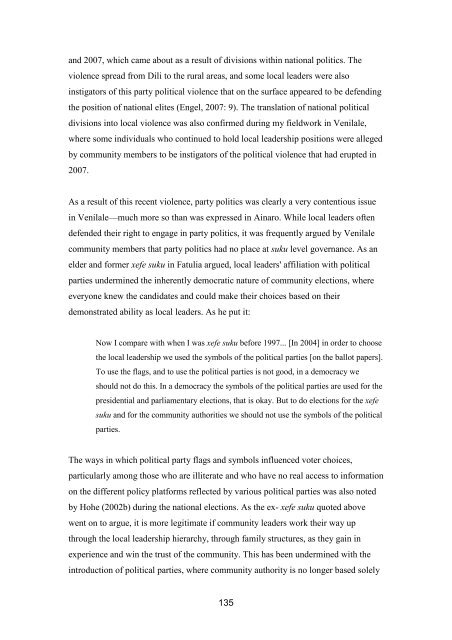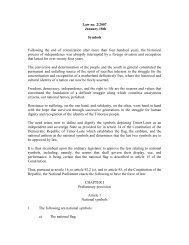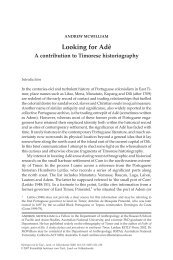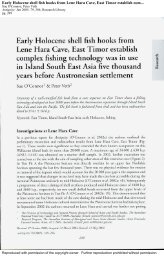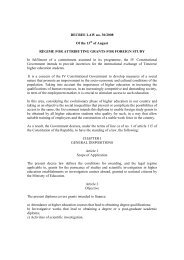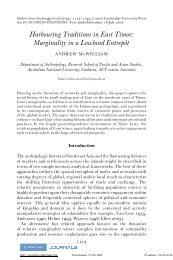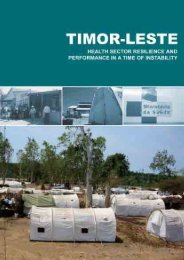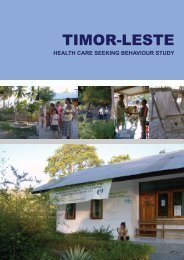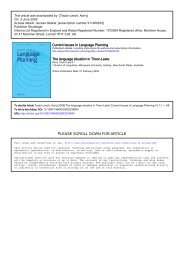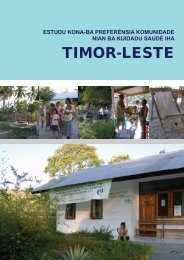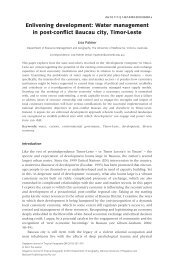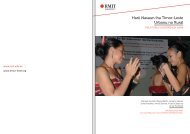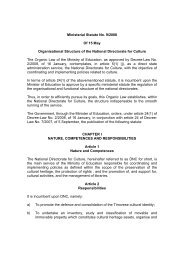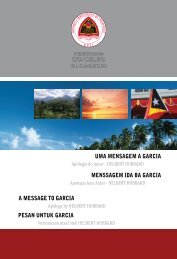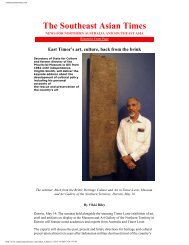Local Governance in Timor-Leste - Secretaria de Estado da Arte e ...
Local Governance in Timor-Leste - Secretaria de Estado da Arte e ...
Local Governance in Timor-Leste - Secretaria de Estado da Arte e ...
- No tags were found...
Create successful ePaper yourself
Turn your PDF publications into a flip-book with our unique Google optimized e-Paper software.
and 2007, which came about as a result of divisions with<strong>in</strong> national politics. Theviolence spread from Dili to the rural areas, and some local lea<strong>de</strong>rs were also<strong>in</strong>stigators of this party political violence that on the surface appeared to be <strong>de</strong>fend<strong>in</strong>gthe position of national elites (Engel, 2007: 9). The translation of national politicaldivisions <strong>in</strong>to local violence was also confirmed dur<strong>in</strong>g my fieldwork <strong>in</strong> Venilale,where some <strong>in</strong>dividuals who cont<strong>in</strong>ued to hold local lea<strong>de</strong>rship positions were allegedby community members to be <strong>in</strong>stigators of the political violence that had erupted <strong>in</strong>2007.As a result of this recent violence, party politics was clearly a very contentious issue<strong>in</strong> Venilale—much more so than was expressed <strong>in</strong> A<strong>in</strong>aro. While local lea<strong>de</strong>rs often<strong>de</strong>fen<strong>de</strong>d their right to engage <strong>in</strong> party politics, it was frequently argued by Venilalecommunity members that party politics had no place at suku level governance. As anel<strong>de</strong>r and former xefe suku <strong>in</strong> Fatulia argued, local lea<strong>de</strong>rs' affiliation with politicalparties un<strong>de</strong>rm<strong>in</strong>ed the <strong>in</strong>herently <strong>de</strong>mocratic nature of community elections, whereeveryone knew the candi<strong>da</strong>tes and could make their choices based on their<strong>de</strong>monstrated ability as local lea<strong>de</strong>rs. As he put it:Now I compare with when I was xefe suku before 1997... [In 2004] <strong>in</strong> or<strong>de</strong>r to choosethe local lea<strong>de</strong>rship we used the symbols of the political parties [on the ballot papers].To use the flags, and to use the political parties is not good, <strong>in</strong> a <strong>de</strong>mocracy weshould not do this. In a <strong>de</strong>mocracy the symbols of the political parties are used for thepresi<strong>de</strong>ntial and parliamentary elections, that is okay. But to do elections for the xefesuku and for the community authorities we should not use the symbols of the politicalparties.The ways <strong>in</strong> which political party flags and symbols <strong>in</strong>fluenced voter choices,particularly among those who are illiterate and who have no real access to <strong>in</strong>formationon the different policy platforms reflected by various political parties was also notedby Hohe (2002b) dur<strong>in</strong>g the national elections. As the ex- xefe suku quoted abovewent on to argue, it is more legitimate if community lea<strong>de</strong>rs work their way upthrough the local lea<strong>de</strong>rship hierarchy, through family structures, as they ga<strong>in</strong> <strong>in</strong>experience and w<strong>in</strong> the trust of the community. This has been un<strong>de</strong>rm<strong>in</strong>ed with the<strong>in</strong>troduction of political parties, where community authority is no longer based solely135


